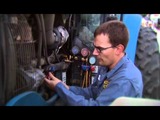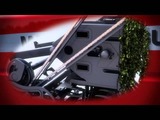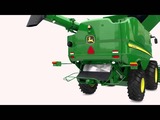I get a lot of questions about which grease is best for a tractor. While I'm not an expert on lubrication, my opinion is, and always has been, that the TYPE of grease is a lot less important than the FREQUENCY of greasing. In 25 years in the ag equipment business I've seen countless incidences of a failure on a piece of equipment that could have been prevented with regular lubrication. I've never once seen a repair that came about because the owner chose the wrong type of grease.
Truth is, for most of us who piddle around with a tractor, do some brush hogging, haul a little dirt around in the bucket and maybe use a grapple to move brush around, a good multi-purpose Lithium grease is all we need. Get one with corrosion inhibitors and oxidation stabilizers. Those additives may drive up the price a little, but they're essential, especially if the equipment is stored outside. That's what I use.
If you'll be using your grease for other applications, then it gets a little more complicated. Let's say you have a skid loader or mini-excavator and you'll be using the grease for both it, and your compact tractor. Then, you may want to move to a Moly grease. Moly greases are more than adequate for light applications like small tractors, and they excel in protection when pins or bushings are under a lot of pressure as they are in an industrial application. They're not a great grease for wheel bearings.
There's been a trend the last few years toward the use of Poly-urea greases. They're definitely a move up from the standard Lithium grease and are used in many sealed bearing applications. Poly-urea greases are thermally stable; high temperature situations don't affect them as they do other greases. They give great oxidation protection and weep oil at a very consistent pace. It is not, however, compatible with other greases. If changing from Lithium grease to Poly-urea, grease more often during the change to work the Poly-urea in to the system.
The absolute top of the line choice for greasing is a synthetic grease. They're EXPENSIVE, but they offer superior heat protection in high speed applications. If you own a round baler or combine with lots of shafts and pulleys moving for hours on end, your owner's manual may tell you to only use synthetic greases. Because of the consistency of synthetics and their ability to dissipate heat, they're the top of the food chain in the grease world.




















